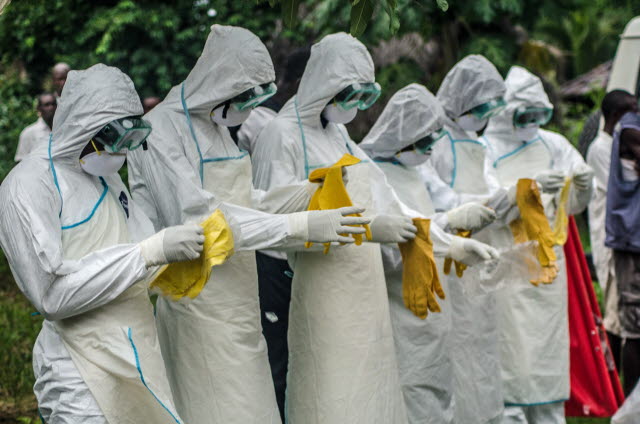DRC in the Midst of Ebola Outbreak Crisis

The Democratic Republic of Congo (DRC) is currently experiencing a nearly year-long Ebola outbreak, making this the second-largest outbreak of the disease ever recorded. More than 2,000 cases of Ebola have been reported to date and of this, two-thirds have been fatal.
Political instability and violent conflict in the DRC have made it more difficult to manage and halt this outbreak. The recent flare-up of violence in northeastern DRC has forced hundreds of thousands of people to flee their homes to escape the fighting, creating a wave of mass displacement in the region.
“Every time you have people moving in high numbers, it’s more complicated to work on follow-ups: contact-tracing, follow-ups on people basically who are supposed to be observed on a daily basis, or for 21 days,” said World Health Organization spokesperson Tarik Jasarevic in response to questions from journalists about the effects of mass displacement on the Ebola outbreak.

Our SOS colleagues in East Africa have been closely monitoring the situation since the outbreak of Ebola in the eastern provinces of the DRC last year.
Following the first confirmed case of Ebola in Uganda, reported in the Kasese district on June 11, SOS Children’s Villages Uganda has begun to take precautionary steps to protect both co-workers and beneficiaries.
Olive Lumonya, National Director of SOS Children’s Villages Uganda, said: “We have alerted staff of the outbreak and how to prevent infection. We have also issued travel restrictions to Kasese and any neighbouring districts.”
Co-workers at SOS Children’s Village Fort Portal, the Village closest to Kasese, have been asked to limit their travel with immediate effect until further notice from the Ministry of Health.

On June 17, Dr. Tedros Adhanom Ghebreyesus, Director-General of the World Health Organization, met with the President of Uganda, His Excellency Yoweri Kaguta Museveni to discuss the Ebola outbreak.
“After seeing the rapid response in Uganda, I can only urge the international community to continue to support the preparedness activities ongoing there and in neighbouring countries,” Dr. Tedros said.
“We have seen concretely how this investment saves lives by controlling the spread of a dangerous pathogen.”
*Update: As of July 17th, 2019, the World Health Organization has declared the current Ebola outbreak a global health emergency. This designation will allow for an increase in resources and awareness to combat the spread of this dangerous disease. This upgraded threat level comes shortly after the first confirmed case of Ebola in the eastern city of Goma, which is home to more than 2 million residents.
**Update: As of August 1st, 2019: The second confirmed case of Ebola in the city of Goma has resulted in another fatality, as well as 2 more confirmed cases of the virus in the deceased's immediate family. One of the new confirmed cases is the 1 year old daughter of the victim. More immediate family members are expected to also test positive for contracting the disease, raising fears the virus may spread throughout the densely populated region. Symptoms can take between 2-21 days to appear.
SOS Children’s Villages continues to monitor the situation in the DRC and neighbouring countries. Canadians wishing to help children during emergencies can donate through our Mayday Fund.
